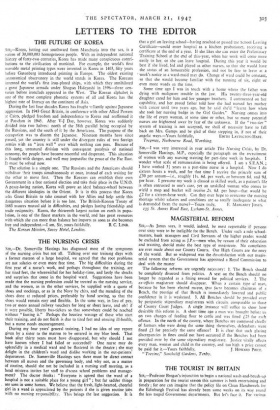THE NURSING CRISIS
SIR,—Dr. Somerville Hastings has diagnosed most of the symptoms of the nursing crisis but not all. Talking over our training days with a former matron of a large hospital, we agreed that the root problems are not salaries or even more free time. The big difficulties during the first year of a nurse's work, and perhaps throughout the training, are her tired 'feet, the wherewithal for her holiday-time, and lastly the shocks and surprises that come in the hospital ward. Suggestions have . been made that the nursing profession could be treated as the nursing service, and the women, as in the other services, be supplied with a quota of shoes and stockings, or as in the Navy by chits, and the mending of the shoes done at reduced prices, preferably by hand sewing, so that the shoes would remain easy and flexible. In the same way, in lieu of pay, two or more annual railway vouchers for long or short leave, and oh! if it were possible, liberty bus-tickets so that somewhere could be reached without " footing it." Perhaps the heaviest wastage of those who start their training, and do not finish is due to tired feet and ensuing ill-health, but a nurse needs encouragement.
During my four years' general training, I had no idea of any report given by a sister to the matron to be entered in my blue book. That book after thirty years must have disappeared, but why should I not have known where I had failed or succeeded? One nurse may do splendidly in a medical ward and be flustered in the theatre ; she may delight in the children's ward and dislike working in the out-patients department. Dr. Somerville Hastings says there must be direct contact between all nurses and the governing body, and. why not, as a matter of routine, should she not be included in a nursing staff meeting, as a head mistress invites her staff to d'scuss school problems and manage- ment? The doctor thinks: "Everyone is agreed that the ward of a hospital is not a suitable place for a young girl "; but far sadder things are seen in some homes. We believe that the fresh, light-hearted, cheerful girl in a ward is appreciated by the patients if she is given routine jobs with no nursing responsibility. This brings the last suggestion. It is that a girl on leaving school—having reached or passed tne School Leaving Certificate—could enter hospital as a kitchen probationer, receiving a certificate at the end of a year. If she likes she can enter the Preliminary Training School at the end of this year, when her work will come more easily to her, or she can leave hospital. During this year it would be best if she lived, fed and played as other nurses, so that she would have the status of an honourable profession, and not be free to leave at a ' week's notice as a ward-maid may do. Change of ward could be constant, so that she would become familiar with the running of six, eight or even more wards in the time.
Some time ago I was in touch with a home where the father was dying with malignant trouble in the jaw. His twenty-three-year-old daughter cared for him and her younger brothers. I commented on her capability, and her proud father told how she had nursed her mother with cancer until two years ago, but he said she'd " learnt how when she took her nursing badge in the Girl Guides." Nursing comes into the life of every woman, at some time or other, but so many potential nurses are frightened away by fear of the unknown. If the " two-tier " system of training is not accepted, we shall of necessity have to fall back on Mrs. Gamps and be glad of their stepping in, if not of their
angelic ways.—Yours faithfully, EDITH LAVINGTON-HART. Tregmay, Nutbourne Road, Worthing.


































 Previous page
Previous page